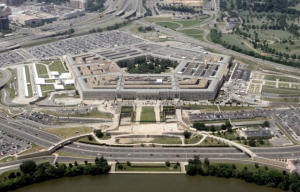|
U.S government shutdown would increase
Pentagon's weapons costs
 Send a link to a friend
Send a link to a friend
 [January 20, 2018]
By Mike Stone [January 20, 2018]
By Mike Stone
WASHINGTON (Reuters) - A U.S. government
shutdown will stall new defense department contracts and ultimately
increase the costs of weapons, creating even more budgetary headaches as
lawmakers grapple with a government funding crisis.
Defense companies and Pentagon officials lamented the potential federal
spending woes, saying it will hurt small suppliers who feed into weapons
production while hitting bigger firms when the contract process is put
on hold.
Congress has been struggling for months to agree on long-term government
funding levels that may also include protections from deportation for
700,000 young undocumented immigrants. The federal government is
operating on a third temporary funding measure since the new fiscal year
began in October.
While the impact of the shutdown will be felt across the government, the
Pentagon has the biggest portion of discretionary spending in the
federal budget and is closely watched given its role in national
security.

Since weapons makers can pass along some costs from a government
shutdown on to the Department of Defense, according to the Secretary of
the Navy, the prospect for higher procurements costs over the long term
is very real.
Navy Secretary Richard Spencer told Reuters a shutdown sends the "signal
that we're going to interrupt cash flow, that's devastating to industry.
That does us no good whatsoever." He added that the increased costs
"come back to us in the form of more expensive equipment."
The Pentagon's largest supplier, Lockheed Martin Corp, told Reuters in a
statement that "a government shutdown could result in costly schedule
delays and breaks in production that will increase overall program costs
and interrupt the delivery of critical equipment to our customers."
[to top of second column]
|

An aerial view of the Pentagon building in Washington, June 15,
2005. REUTERS/Jason Reed/File Photo

Depending on the length of the shutdown it could cost hundreds of
millions of dollars for the Pentagon, or even billions
government-wide in terms of legal disputes over contracts,
procurement delays and downstream litigation costs said Franklin
Turner, a partner in the government contracts and export control
practice at McCarter & English LLP.
While the Navy's biggest shipbuilder, Huntington Ingalls Industries,
said the near-term impact would be "minimal", its nearly
5,000-strong supply chain would likely feel the most impact because
the lack of a federal budget creates uncertainty. That in turn
inhibits their ability to hire and make capital investments.
During a 16-day shutdown in 2013, small business contracts with the
Department of Defense dropped by almost one-third and spending
dropped 40 percent, according to Office of Management and Budget.
The Pentagon's former chief weapons buyer Frank Kendall said
"Industry may bear some of these costs, but will pass as much of
those costs to the taxpayers as possible." Kendall, who is currently
an advisor with Renaissance Strategic Advisors, worked through the
2013 shutdown.
(Reporting by Mike Stone in Washington; Editing by Chris Sanders and
James Dalgleish)
[© 2018 Thomson Reuters. All rights
reserved.]
Copyright 2018 Reuters. All rights reserved. This material may not be published,
broadcast, rewritten or redistributed.
 |